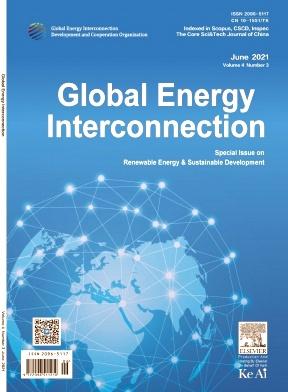考虑碳交易和需求响应的氢耦合综合能源系统分布式鲁棒优化调度
IF 1.9
Q4 ENERGY & FUELS
引用次数: 0
摘要
应对气候变化和促进可再生能源(RESs)的大规模整合推动了氢耦合综合能源系统(HIES)的发展,通过协调电力、热能、天然气和氢的利用来提高能源的可持续性。本文提出了一种基于两阶段分布鲁棒优化(DRO)的调度方法,以提高HIES的经济效率和减少碳排放。该框架采用阶梯型碳交易机制来调节排放,并实施需求响应(DR)计划来调整灵活的多能源负荷,从而优先考虑可再生能源的消费。通过模糊集解决可再生能源发电和负荷需求的不确定性,从而实现稳健的决策。柱约束生成(C&;CG)算法有效地求解了两阶段DRO模型。案例研究表明,与传统方法相比,该方法降低了3.56%的运营成本,提高了5.44%的光伏消费率,并显著降低了碳排放。此外,与传统的随机和鲁棒优化方法相比,DRO框架在保守性和鲁棒性之间取得了卓越的平衡,突出了其在推进低成本、低碳能源系统的潜力,同时确保了不确定性下电网的稳定性。本文章由计算机程序翻译,如有差异,请以英文原文为准。
Distributionally robust optimization-based scheduling for a hydrogen-coupled integrated energy system considering carbon trading and demand response
Addressing climate change and facilitating the large-scale integration of renewable energy sources (RESs) have driven the development of hydrogen-coupled integrated energy systems (HIES), which enhance energy sustainability through coordinated electricity, thermal, natural gas, and hydrogen utilization. This study proposes a two-stage distributionally robust optimization (DRO)-based scheduling method to improve the economic efficiency and reduce carbon emissions of HIES. The framework incorporates a ladder-type carbon trading mechanism to regulate emissions and implements a demand response (DR) program to adjust flexible multi-energy loads, thereby prioritizing RES consumption. Uncertainties from RES generation and load demand are addressed through an ambiguity set, enabling robust decision-making. The column-and-constraint generation (C&CG) algorithm efficiently solves the two-stage DRO model. Case studies demonstrate that the proposed method reduces operational costs by 3.56%, increases photovoltaic consumption rates by 5.44%, and significantly lowers carbon emissions compared to conventional approaches. Furthermore, the DRO framework achieves a superior balance between conservativeness and robustness over conventional stochastic and robust optimization methods, highlighting its potential to advance cost-effective, low-carbon energy systems while ensuring grid stability under uncertainty.
求助全文
通过发布文献求助,成功后即可免费获取论文全文。
去求助
来源期刊

Global Energy Interconnection
Engineering-Automotive Engineering
CiteScore
5.70
自引率
0.00%
发文量
985
审稿时长
15 weeks
 求助内容:
求助内容: 应助结果提醒方式:
应助结果提醒方式:


